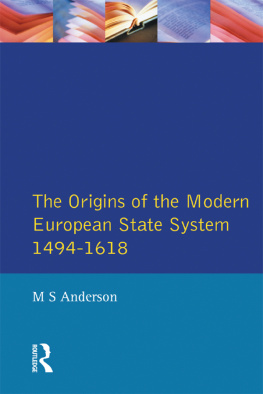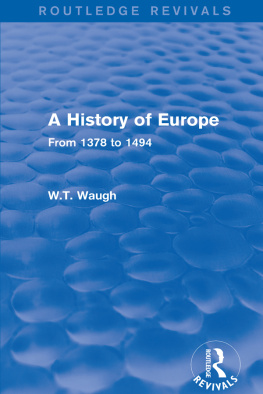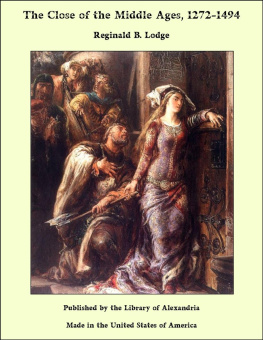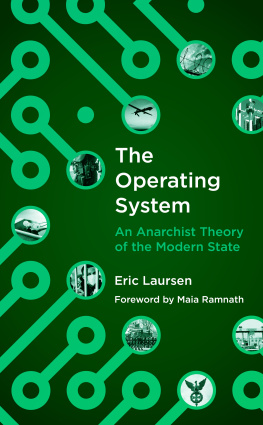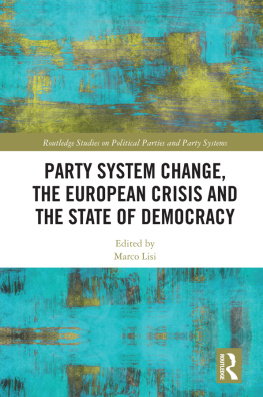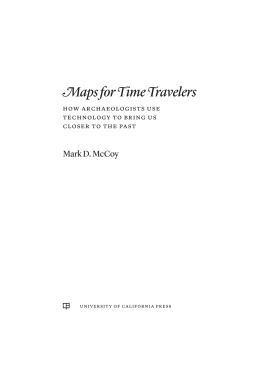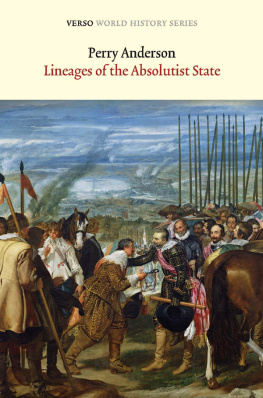M.S. Anderson - The Origins of the Modern European State System, 1494–1618
Here you can read online M.S. Anderson - The Origins of the Modern European State System, 1494–1618 full text of the book (entire story) in english for free. Download pdf and epub, get meaning, cover and reviews about this ebook. publisher: Routledge, genre: History. Description of the work, (preface) as well as reviews are available. Best literature library LitArk.com created for fans of good reading and offers a wide selection of genres:
Romance novel
Science fiction
Adventure
Detective
Science
History
Home and family
Prose
Art
Politics
Computer
Non-fiction
Religion
Business
Children
Humor
Choose a favorite category and find really read worthwhile books. Enjoy immersion in the world of imagination, feel the emotions of the characters or learn something new for yourself, make an fascinating discovery.
- Book:The Origins of the Modern European State System, 1494–1618
- Author:
- Publisher:Routledge
- Genre:
- Rating:3 / 5
- Favourites:Add to favourites
- Your mark:
- 60
- 1
- 2
- 3
- 4
- 5
The Origins of the Modern European State System, 1494–1618: summary, description and annotation
We offer to read an annotation, description, summary or preface (depends on what the author of the book "The Origins of the Modern European State System, 1494–1618" wrote himself). If you haven't found the necessary information about the book — write in the comments, we will try to find it.
The Origins of the Modern European State System, 1494–1618 — read online for free the complete book (whole text) full work
Below is the text of the book, divided by pages. System saving the place of the last page read, allows you to conveniently read the book "The Origins of the Modern European State System, 1494–1618" online for free, without having to search again every time where you left off. Put a bookmark, and you can go to the page where you finished reading at any time.
Font size:
Interval:
Bookmark:
The Origins of the Modern European
State System, 14941618
THE MODERN EUROPEAN STATE SYSTEM
THE ORIGINS OF THE MODERN EUROPEAN STATE SYSTEM 14941618
A long-running staple of the Longman History list has been the distinguished and highly successful trio of books by Derek McKay and H.M. Scott (16481815), Roy Bridge and Roger Bullen (18141914), and Graham Ross (19151945) on the development of the European state system and the rise and fall of the European great powers. The original sequence is now being rewritten, expanded and extended to cover the whole span of modern European history from the late fifteenth century to the present day. The five volumes (each self-sufficient and useable separately) will be published under the series title The Modern European State System. Here, M.S. Andersons entirely new introductory volume, The Origins of the Modern European State System, 14941618, inaugurates the enterprise in fine style.
The Origins of the
Modern European
State System,
14941618
M.S. Anderson

First published 1998 by Addison Wesley Longman Limited
Published 2014 by Routledge
2 Park Square, Milton Park, Abingdon, Oxon OX14 4RN
711 Third Avenue, New York, NY 10017, USA
Routledge is an imprint of the Taylor & Francis Group, an informa business
Copyright 1998, Taylor & Francis.
The right of M. S. Anderson to be identified as author of this Work has been asserted by him in accordance with the Copyright, Designs and Patents Act 1988.
All rights reserved. No part of this book may be reprinted or reproduced or utilised in any form or by any electronic, mechanical, or other means, now known or hereafter invented, including photocopying and recording, or in any information storage or retrieval system, without permission in writing from the publishers.
Notices
Knowledge and best practice in this field are constantly changing. As new research and experience broaden our understanding, changes in research methods, professional practices, or medical treatment may become necessary.
Practitioners and researchers must always rely on their own experience and knowledge in evaluating and using any information, methods, compounds, or experiments described herein. In using such information or methods they should be mindful of their own safety and the safety of others, including parties for whom they have a professional responsibility.
To the fullest extent of the law, neither the Publisher nor the authors, contributors, or editors, assume any liability for any injury and/or damage to persons or property as a matter of products liability, negligence or otherwise, or from any use or operation of any methods, products, instructions, or ideas contained in the material herein.
ISBN 13: 978-0-582-22944-0 (pbk)
British Library Cataloguing in Publication Data
A catalogue entry for this title is available from the British Library
Library of Congress Cataloging-in-Publication Data
Anderson, M. S. (Matthew Smith)
The origins of the modern European state system, 14941618 / M.S. Anderson.
p. cm.
Includes bibliographical references and index.
ISBN 0-582-22945-6 (CSD). ISBN 0-582-22944-8 (PPR)
1. Europe-History-14921648. 2. State, The-Origin. I. Title.
D231.A53 1998
940.21-dc21 97-31324
CIP
Set by 7 in 10/12 New Baskerville
It would have been impossible to write this book without the help of several great libraries. I have drawn upon the resources of the British Library, more heavily upon those of the British Library of Political and Economic Science, the library of my old college, the London School of Economics, and most heavily of all upon those of the London Library. To all of them I must express my thanks. I have also benefited greatly from the comments made on an earlier draft by Professor M.J. Rodriguez-Salgado and Dr Hamish Scott. I have not followed all their suggestions; but this does not lessen my gratitude for the time and care they gave to reading and improving what I had written. It goes without saying that for any defects that still remain I alone am responsible.
M. S. Anderson
It is appropriate that any account of international relations in Europe between those two traditional historical signposts, the French invasion of Italy in 1494 and the beginning of the Thirty Years War in 1618, should begin with a consideration of war and its implications. Throughout this period armed struggle, potential or actual, was the most important and enduring influence on the relationships between the European states. Personal rivalries between monarchs, conflicting dynastic claims, the workings of a still embryonic balance of power, generated conflicts to which religious antagonisms, between Christians and Muslims, later between Catholics and Protestants, added a more emotional dimension. War to men of that age was a natural condition, as natural as peace and perhaps more so. Martin Luthers often-quoted remark that it was as necessary as eating, drinking, or any other business expressed a viewpoint from which few would have seriously dissented; and the voice of these few was a weak and ineffective one which rulers and their ministers could safely ignore. Erasmus might attack the aggressiveness and territorial ambitions of rulers. Anabaptists might put forward their own brand of Christian pacifism. None of this made any practical difference. War, it seemed, had always existed and always would.
It could also be seen not merely as natural and inevitable but as in many ways and for much of society beneficial. The long-standing belief that it was the salutary punishment decreed by God for the transgressions of sinful mankind, and therefore part of the divine scheme Such attitudes were to persist, unchanged in essentials, until the cataclysm of 1914.
Moreover, in an age with nothing approaching modern police forces crime, disorder, riot, discontent of any kind which might erupt in violence, were a continual threat. A war which swept, often forcibly, the unemployed, the vagrant, the starving and the criminal into the army, and sent them off to fight and die comfortably far from home, very often seemed to the respectable a valuable social safety-valve. Foreign war might well be the best of all guarantees of domestic peace.
Again, belief in the supreme importance of honour, the pervasive emphasis on personal glory and prestige, the persistence of a legacy of chivalric attitudes, meant that to rulers and nobilities alike war was often welcome as an opportunity to achieve these intangible but deeply important objectives. Frequently it was embarked on with what now seems almost criminal light-heartedness, without any clear idea of how it was to be paid for or what it might reasonably hope to achieve. At the very summit of society, to command successfully on the field of battle gave a monarch prestige as nothing else could. The young Henry VIII of England was perhaps the most obvious of a number of rulers who showed themselves very conscious of this fact; and the two who dominated the first half of the sixteenth century in western Europe, Francis I of France and the Emperor Charles V, were both at times prominent on the battlefield. There were certainly kings with different attitudes. Ferdinand VII of Aragon, Henry VII of England and Louis XII of France played little active military role (though this seemed unusual, perhaps even a little suspect, to their contemporaries). Philip II of Spain was only twice in his life, as a young man, even distantly involved in military operations, and never commanded on the battlefield. Nevertheless the ideal of the ruler who vindicated his territorial or dynastic claims by war, and if possible by personal leadership in the field, remained a powerful one. After all, the Church had for centuries taught that a just war was fully permissible; and arguments could always be found to maintain the justice of almost any conflict, even between Christians. War against the infidel, it went without saying, was not merely permissible but highly praiseworthy.
Next pageFont size:
Interval:
Bookmark:
Similar books «The Origins of the Modern European State System, 1494–1618»
Look at similar books to The Origins of the Modern European State System, 1494–1618. We have selected literature similar in name and meaning in the hope of providing readers with more options to find new, interesting, not yet read works.
Discussion, reviews of the book The Origins of the Modern European State System, 1494–1618 and just readers' own opinions. Leave your comments, write what you think about the work, its meaning or the main characters. Specify what exactly you liked and what you didn't like, and why you think so.

